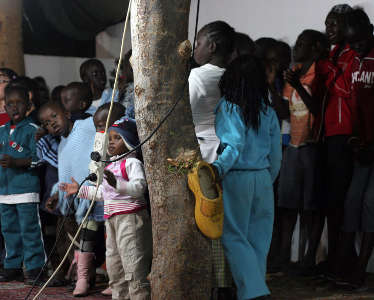Sudanese Refugees Find Shelter at Messianic Ministry
 The
The
genocide staged by Sudan’s Islamist regime keeps topping
the lists of contemporary disasters. Some 3.5 million South Sudanese Christians
and animists have been killed in a brutal “conversion” campaign that has lasted
more than 25 years. Millions have fled their homes, seeking shelter from
starvation, slavery and violent death.
But among the desert mountains across which Moses fled with another persecuted
people long ago some of these Sudanese believers have found refuge in a place
aptly named The Shelter.
The Shelter is a backpackers’ hostel in
Eilat, Israel, a busy port city located at the northern
tip of the Red Sea between Jordan and Egypt. The
ministry, run by Eilat’s Messianic congregation—the only church in town—got involved when the refugees started crowding into Eilat in 2007.
“We soon had
many shocked and injured people sitting in The Shelter’s yard,” recalled Judy
Pex, who with husband John founded the church 29 years
ago.
Church member Mansor, an ethnic Israeli Druze
who shared their Arabic language, approached bakeries for leftover bread and
shoe shops for free sandals. Most of the Sudanese had come barefoot. He and other young Israelis also persuaded a beach owner to let them throw a Red Sea welcome
party.
“For us hanging out on the beach is an ordinary thing,”
Mansor said. “For the Sudanese it was very special. One guy, Gabriel, who is in
his late 20s, told me it had been the best day of his life. He had always been
on the run, since he was a boy. He told me he was the only one under 30 from his
village … still alive.”
In a yet-to-be-published
book, Judy Pex retells the life stories of some of the refugees. Their
testimonies speak of the high hopes that many Sudanese Christians put in
Israel.
“The title of my book, Tall, and With Smooth Skin, is a quote
from Isaiah 18:7,” Judy Pex explained. “The Sudanese believe that they are the
smooth-skinned people referred to, and that the river mentioned is the Upper
Nile running through South Sudan. That is why they feel so affiliated with
Israel, and risked their lives to get here.”
Many who made it to Eilat arrived with bullets in their
legs, Judy Pex said. The Egyptian border police were under orders to fire. In
some families the husband made it across carrying a child, while his wife got
caught at the last minute.
In Israel the Sudanese were treated
humanely, but not necessarily welcomed. Yien, now a leader in
the Eilat Messianic congregation, spent a year in an Israeli prison.
“I was so wondering why no Christians came to visit,” said Yien, whose
faith nearly cost him his life.
He moved to North Sudan to attend school,
hoping to become a pastor. While in Sudan’s capital, Khartoum, working for an
evangelical church in its outreach to street children, he was caught and
tortured by the Islamist military.
“The regime does not accept Christian
humanitarian aid,” Yien said.
Contacting his wife or his pastor meant endangering them, so when Yien
got a chance, he simply ran-through Egypt, through the desert. He has lived in
Israel for two years and says he may be expelled at any time.
Since the Sudan peace agreement was signed in 2005, the
South Sudanese no longer enjoy a refugee status, though conditions in
Sudan are still desperate, and the
referendum for autonomy, key to the peace agreement, is due in 2011.
Some of the Sudanese Christians are opting to return to their homeland
with the help of the International Christian Embassy in Jerusalem (ICEJ) in a
controversial repatriation project. The ICEJ argues that the repatriates can
help rebuild the country. But Sudanese pastors in exile and concerned Israeli
believers told Charisma that South Sudan is anything but safe for
returning women and children.
At The Shelter in Eilat, 17-year-old Johannes says he is willing to
return—to look for his mother who he has not seen for 12 years. Mansor, his
youth leader, is worried. “It is a very bad idea,” he said, “but what can you
say to a kid wanting to find his mom?”














































